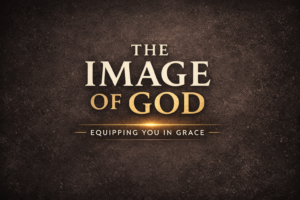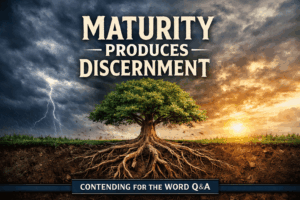⏱️ Estimated Reading Time: 12 min read
Jesus came from God. The New Testament authors leave no room for doubt as to the agency of God the Father in sending Jesus Christ the Son. Christmas was God’s idea. It was God’s purpose which he “set forth in Christ as a plan for the fullness of time.” (Eph 1:9-10). Throughout the Gospels, Jesus repeatedly refers to “the Father who sent me” (Jn 5:23, 37; 6:44; 8:16, 18; 12:49). As Paul writes in Galatians 4:4–5, “But when the fullness of time had come, God sent forth his Son, born of woman, born under the law, to redeem those who were under the law, so that we might receive adoption as sons. (Gal 4:4-5). God sent forth his Son. Christmas was God’s idea.
Matthew was convinced of this, which is why he wrote his Gospel. Matthew wrote to a largely Jewish audience seeking to convince them that Jesus was the Christ. And in order to present a compelling argument, Matthew opens his account with the genealogy of Jesus Christ. It’s his family tree.
Now, you may think that sounds about as boring as reading the Mingee Family story (that would be mine). But, perhaps not. Michael Green comments, “At the very beginning of the Gospel the all-embracing love of God is emphasized. Nothing can stand in its path. There is nobody who does not need it. Maybe the genealogy is not so dry after all!” (BST, 59).
As we consider Matthew’s account of Jesus’ genealogy, we find four reasons to marvel at Jesus’ family tree:
- Marvel that God has a genealogy
We ought to be struck, right out of the gate, with the profound realization that God has a genealogy. Matthew will, throughout his gospel, highlight the fact that Jesus is God. Later in chapter one, Matthew quotes the prophet, Isaiah, “Behold the virgin shall conceive and bear a son, and they shall call his name Immanuel” and then adds this commentary, “which means, God with us.” (Matt 1:23). As he introduces the forerunner, John the Baptist, Matthew again turns to Isaiah, “The voice of one crying in the wilderness: ‘Prepare the way of the Lord, make his paths straight.” (Matt 3:3). In Matthew 9, Jesus heals a paralytic and proclaims, “Take heart, my son; your sins are forgiven.” (Matt 9:2), which prompts the scribes to charge him with blasphemy. This charge of blasphemy is echoed as the chief priests, with the scribes and elders, mocked the crucified Christ saying, “He trusts in God; let God deliver him now, if he desires him. For he said, ‘I am the Son of God.’ (Matt 27:43). But these ruler’s condemnation is soon contrasted with the centurion’s confession, “Truly this was the Son of God!” (Matt 27:54).
Jesus is God. This biblical declaration puts orthodox biblical Christianity in disagreement with Jehovah’s Witnesses, who claim that Jesus was God’s first created being. No, we agree with John, who wrote, “in the beginning was the Word, and the Word was with God, and the Word was God. (John 1:1). John traces this until verse 14, when he writes, “And the Word became flesh and dwelt among us, and we have seen his glory, glory as of the only Son from the Father, full of grace and truth.” (Jn 1:14). The second person of the Trinity, the eternal Son of God, through whom all things were made, without whom was not anything made that has been made, He became flesh. He was there in the counsel of the Trinity in eternity past with the Father and the Spirit. He existed even before earth came into being or time began. And yet, he took on flesh and was born.
Christian, marvel at the fact that God has taken on flesh. Stand amazed by the Incarnation. Charles Spurgeon called it a “beautiful condescension” in his exegetical comments on Matthew. As many of us will sing this Christmas season:
Christ, by highest heav’n adored,
Christ, the everlasting Lord:
Late in time behold Him come,
Offspring of a virgin’s womb.
Veiled in flesh the Godhead see,
Hail th’ incarnate Deity!
Pleased as man with man to dwell,
Jesus our Immanuel.
Marvel that God the Son, has a genealogy.
2. Marvel at who is in the genealogy
Matthew begins his gospel, “The book of the genealogy of Jesus Christ, the son of David, the son of Abraham.” (Matt 1:1). From those opening words, he reveals his theme and thrust. He is presenting a historical survey of Israel, who began with Abraham and found their king in David. Matthew presents this survey not with an eye for historical accuracy but with a heart for theological clarity. He explains, “So all the generations from Abraham to David were fourteen generations, and from David to the deportation to Babylon fourteen generations, and from the deportation to Babylon to the Christ fourteen generations.” (Matt 1:17). Well, yes, when you arrange them the way Matthew did.
Matthew is selective. He includes some names and leaves others out. He is presenting a royal list that highlights Jesus as the climax of God’s work among his people. R.T. France explains, “the theological focus of Matthew’s ‘book of origin’ is not so much on the number ‘fourteen’ itself as on the royal dimension which his symmetrical structure has bought to light by tracing the line of succession which finds its culmination in the coming of Jesus, the ‘son of David.’ (NICNT, 32)
Most kings would trace their lineage through other kings and those who had performed great deeds. They might follow the line all the way back to whichever ancestor had defeated everyone else’s ancestors in order to become the first king in that place. Thus, these kings conclude, “I am great because my ancestors were great.”
But not so with Jesus. When we see who Matthew includes in this genealogy of Jesus, we’re not impressed and were repulsed. It’s as though God includes those who we would be tempted to exclude. Remember what we said at the beginning: When we come to terms with who Jesus came from, we come to understand who Jesus came for.
We see four mothers included throughout the genealogy. These four women are surprising inclusions for a few reasons. First, they’re women. In her book, Confronting Christianity, Rebecca McLaughlin spends a chapter answering the question, “Doesn’t Christianity Denigrate Women?” She points out that, “In a male-dominated culture, Jesus’ attention to women throughout his preaching is remarkable” (136).
Matthew’s intentional inclusion of women, coupled with Jesus’ intentional inclusion of women in his ministry, challenges a male-dominated understanding of Christianity that many people hold, even today. McLaughlin writes, “Just as we cannot cling to a white-centric perception of Christianity in the face of the global church, so we cannot maintain a male-oriented view. […] Around the globe, the people most likely to be Christians are women of color.” McLaughlin concludes this chapter:
“the Bible’s words on women are the words of a man who lays down his life. The ultimate man laid down his life for the billions of women who have trusted him with theirs. Does Christianity denigrate women? On the contrary. It lifts us into fellowship with God himself.” (152).
Not only is it surprising that Mtthew would include them because they are women, but they are non-Israelite women. Tamar and Rahab were Canaanites, Ruth a Moabite, and Bathsheba, the wife of a Hittite. Thus, Matthew is pointing us to the global nature of God’s blessing, which he pointed out and promised to Abraham in Genesis 12. All the families of the earth would be blessed, not just Jewish families. And so, all the families of the earth are invited and compelled to worship at the feet of Christ. We’ll see this as the “wise men from the East” (Matt 2:1) come to acknowledge the kingship of Jesus. We’ll see this emphasized again at the closing of the gospel as Jesus commands his followers to “make disciples of all nations.” (Matt 28:19).
So, we’re surprised because they’re women. We’re surprised because they are non-Israelite women. And finally, we’re surprised because of the sinfulness that is found in each of their stories. You don’t have to dig very deep to discover some embarrassing backgrounds to these women. Now, lest we’re tempted to think that it’s only the women who were sinful, let’s consider the men. Abraham epitomized cowardice as he threw Sarai, his wife, under the bus to save his own skin, on more than one occasion. David… well Matthew himself, refers to David with these words, “David was the father of Solomon by the wife of Uriah.” (Matt 1:6). Solomon was a polygamist, and Hezekiah was proud. Commentator Douglas Sean O’Donnell says that it’s as though Matthew were presenting us with a criminal line up! (Preaching the Word commentary).
We are meant to be struck with the mess of Jesus’ family tree. This is the scandal of grace. And let’s be honest. It’s our only hope. If we could only enter the kingdom of God with the perfect pedigree, none would qualify. We, like sinful Tamar and sinful Solomon, must be adopted. Christian, marvel at who is in the genealogy.
3. Marvel at why Jesus has a genealogy
We’ve marveled at the fact that God has a genealogy. We’ve marveled at who is in the genealogy. Now, marvel at why Jesus has a genealogy. Matthew begins the genealogy “the book of the genealogy of Jesus Christ,” (Matt 1:1) and gets to Jesus in the genealogy and marks his birth with these words, “who is called Christ” (Matt 1:16). This is not his last name, but his theological title: Messiah.
R.T. France explains, “the colorless translation ‘Jesus Christ’ … does not do justice to the excitement in Matthew’s introduction of Jesus under the powerfully evocative title ‘Messiah,’ the long-awaited deliverer of God’s people, in whom their history has now come to its climax.” (NICNT, 35). Matthew is claiming that Jesus is the one to whom the Old Testament points. Every story whispers his name.
That title, Messiah, is clarified when the angel tells Joseph in a dream, “she will bear a son, and you shall call his name Jesus, for he will save his people from their sins.” (Matt 1:21). That is why Jesus has a genealogy. That is why the eternal Son of God left the throne of heaven for the cradle and the cross on earth. That is why he became the Suffering Servant of Isaiah 53. Christ in highest heaven adored became the man “despised and rejected” (Isaiah 53:3).
Jesus clarifies this throughout his ministry. “The Son of Man came to seek and to save the lost.” (Luke 19:10). “I have not come to call the righteous but sinners to repentance.” (Luke 5:32). The apostle Paul, reflecting on his salvation, marveled, “Christ Jesus came into the world to save sinners…” (1 Tim 1:15). So, are you lost? Are you far from God? Are you at enmity with God? Are you still in your sin? If you were to die today, what would keep you out of heaven?
Sinner, come to Christ. Trust Christ. Find rest from your sin and hope for heaven in Christ. Jesus explained to Nicodemus, “For God so loved the world, that he gave his only Son, that whoever believes in him should not perish but have eternal life.[17] For God did not send his Son into the world to condemn the world, but in order that the world might be saved through him. [18] Whoever believes in him is not condemned, but whoever does not believe is condemned already because he has not believed in the name of the only Son of God.” (John 3:16–18). Marvel at why Jesus has a genealogy.
4. Marvel that you can become a child of God
As Matthew wrote his gospel, he was not merely writing to inform but to compel. He wrote to a Jewish audience to convince them that Jesus was the Christ in whom they should place their trust. That’s the point for you as well. The point is not that you would know the family tree of Jesus. But that you would be included in the family tree of Jesus.
As John marvels at the coming of Christ into the world, he notes, “to all who did receive him, who believed in his name, he gave the right to become children of God, who were born, not of blood nor of the will of the flesh nor of the will of man, but of God.” (John 1:12-13). Just as Jesus said to Nicodemus so he says to you, “you must be born again.” (John 3:3). And you can be. Though you be as sinful as David or Solomon. Though your family tree be as in ruins as Jesus’. Though you are as ashamed of your past as Tamar or Bathsheba. Though you’ve tried to put on a smiling face and a positive outlook, knowing that inside you are a mess. You can be born again and adopted into the family of God. You, through repentance and faith, can become a child of God.
So, is that you? Are you trusting in Christ? Have you been adopted in Christ? This Christmas, as you consider the family tree of Jesus, don’t let it be the family tree of a distant stranger or even a distant Savior. Hear the invitation to be grafted in and adopted into this family. For when we come to terms with who Jesus came from, we come to understand who Jesus came for. He came for sinners. He came for you.




